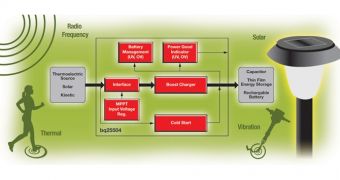Texas Instruments wants to make it possible for all electronics to generate or harvest their own power, so it created a new integrated circuit (IC) called bq25503.
Giving a device the ability to make its own energy is a key to making technology essentially self-sufficient, if one were to disregard the need for repairs and such.
This is precisely what Texas Instrument sought when it built the bq25503 integrated circuit (IC).
While it will be the job of the hardware in general to consume as little energy as possible, this chip will have to act as a nano-generator.
In other words, it will do its best to produce energy that the item it serves can then utilize.
According to TI, the IC can harvest energy in the microwatts to milliwatts range and is aimed at handsets that come with solar panels.
That means that a solar panel will be put to work even in indoor light conditions and, furthermore, the boost charger can harvest up to 30% to 70% more power than linear regulators.
For people that don't care much about all this technical speak, the IC is, basically, a small component that produces power to gradually recharge a battery.
Solar power isn't even the only source that the bq25503 can make good of. It turns out that TI was more thorough than that.
Besides solar energy, the IC can harvest electromagnetic and thermoelectric energy manifestations, as well as vibrations.
Batteries and super capacitors will be tasked with actually storing the energy produced by the chip (just how many of these things make it inside a handset falls to said handsets' makers to decide).
A final asset of the Texas Instruments bq25503 IC is that, thanks to the boost in usable energy harvesting, the solar panels will not have to be as large and thick as they are today. Thus, products as a whole should get thinner and cheaper as time passes.

 14 DAY TRIAL //
14 DAY TRIAL //